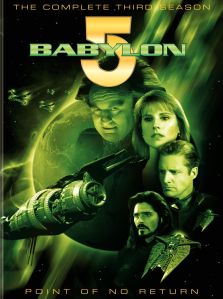The Shadow War intensifies and Babylon 5 goes through exciting changes, but the characters still feel underdeveloped.
*** SPOILER ALERT: DO NOT READ UNTIL YOU HAVE FINISHED WATCHING SEASON 3***
The Story
Structurally, Season 3 of Babylon 5 works much better than either of the previous two seasons. The show is beginning to take on a more serialized nature in which episodes flow seamlessly into each other. The tension and drama of one episode carries over into the next. The high point is definitely President Clark’s imposition of martial law and Sheridan’s decision to secede from Earth. It’s a big moment for the show, perhaps even the turning point, and Babylon 5 treats it as an appropriately historic moment. Just as importantly, the secession has realistic repercussions. The station crew must find new ways to obtain revenue because they can no longer rely upon tax revenue from Earth. I’m glad to see that the decision to secede wasn’t simply portrayed as an unadulterated good.
So far, the Shadow War hasn’t built very much tension. There’s never a point at which we as the audience worries that the heroes might lose. We never experience the horror of war, or even any deaths, in the way that Season 2’s “GROPOS” showed the consequences of an assault on an alien base. Sheridan encounters three Shadow vessels in Season 3 and destroys all three. Granted, the ways in which he destroyed them were quite ingenious and entertaining to watch, but nevertheless the victories came too easily given the hype surrounding the Shadows in Seasons 1 and 2. For comparison, in Star Trek: Deep Space Nine’s Dominion War, the heroes were actually forced off the Deep Space Nine space station and suffered major defeats that took an emotional toll on the characters. It’s really only by the season finale, “Z’ha’dum,” that I got the sense that this was the beginning of an epic conflict.
A smaller problem I had with the Shadow War is Draal’s role, or lack thereof. Draal continues to reappear in random episodes to say, “Hi, I’m still here.” Yet, for all of this foreshadowing, he’s conveniently taken out of the picture when his help would have mattered most. When a fleet of Shadow vessels arrives in “Z’ha’dum,” they manage to jam transmissions from Epsilon III. Yet, if Draal’s planetary machine is so powerful, how can the Shadows block it? Wouldn’t the Babylon 5 crew have anticipated this problem and planned for a contingency? After all, the planet is their most important line of defense and Draal did promise to render assistance. As I said, small problem, but I can’t help but wonder why the show keeps reminding us about him.
The Characters
Babylon 5 still struggles with its human characters, with two exceptions (discussed below). Ivonova and Garibaldi are enigmas. They’re both likable characters, but neither has a very strong arc. What is Ivonova’s journey? How has Garibaldi changed since Season 1? This has become even more problematic in Season 3 given the context. The characters are now enmeshed in a major war and have seceded from Earth. How do they feel about this? What have they lost? I just don’t know at this point.
Season 3 also introduces Marcus Cole, a Ranger.Marcus is not simply another milquetoast personality, but is also whiny and annoying. For example, he refuses to participate in a Minbari giving ceremony because he complains that he has already lost so much and doesn’t have anything left to give. He comes across as petty rather than pained. The writers tried to make him funny, but I prefer Ivonova’s caustic wit. Ultimately, I’m not sure what the character adds to the show or why he was added.
I mentioned two exceptions amongst the humans, and fortunately they are worthwhile. First, we start to see the war take its toll on Sheridan. Boxleitner manages to convey the inspiration of leadership as well as the burdens of command. His romance with Delenn is subtle but effective. Sheridan relies on her both as a friend but also as somebody he trusts to share responsibility. When his presumed-dead wife Anna Sheridan appears on the station, Sheridan’s world is turned upside down. It’s a great dilemma for the character, forcing him to risk everything – his cause, his friends, his life – to return to Z’ha’dum in order to learn what happened to Anna.

More surprisingly, Dr. Stephen Franklin also has a real arc in Season 3. Unlike the other characters, as the doctor, Franklin sees the pain and damage caused by war at a much more intimate level. He sees the victims of war every day, often bloodied beyond help. For a man driven to help others, it’s easy to see why he would lose control and resort to drugs to keep himself going. The confrontation between Franklin and Garibaldi about his Stim addition works beautifully as a crucial moment for this character. It’s important that Franklin comes to the realization about his addiction by diagnosing his own blood levels. As the rational doctor, he must be persuaded by clear scientific evidence. The end of Season 3 sets Dr. Franklin up for a deeper personal journey.
Overall
In Season 3 of Babylon 5, I finally began to understand why fans like this show so much. I didn’t discuss the Londo-G’Kar relationship in this review because there are only so many ways I can say something is excellent. Fortunately, the rest of the show is starting to catch up with the high standards set by Narn-Centauri storyline.
My journey through Baylon 5 continues next week with Season 4…


Pingback: “Babylon 5″ (Season 2) | NardiViews